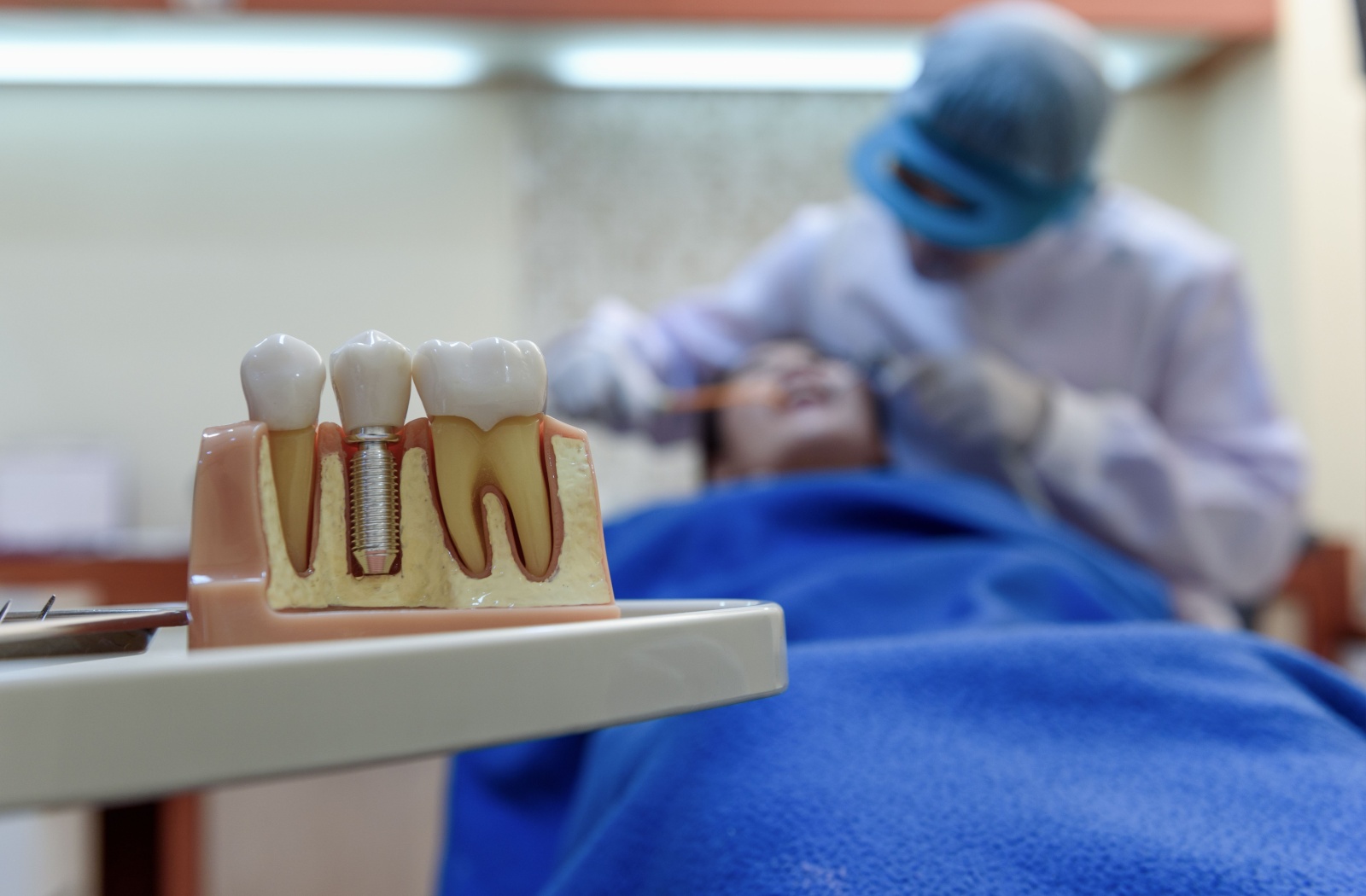How Long Do Dental Implants Last?

Missing or damaged teeth can affect more than just your smile—they can change how you eat, speak, and feel about yourself. Dental implants are a long-term, cosmetic dentistry solution that can help restore your smile and oral health. But how long do they last?
Dental implants can last 10–30 years or even longer with proper care, often functioning as a permanent solution for missing teeth. Their longevity depends on several factors, including oral hygiene, lifestyle habits, and overall health.
Whether you’re considering dental implants for the first time or exploring options to replace old restorations, it’s helpful to understand how implants work and how to support their long-term success.
What Are Dental Implants?
Dental implants are artificial tooth roots that a dentist surgically places into the jawbone. They’re typically made from biocompatible materials like titanium, which fuse naturally with bone over time.
Once the implant is secured, a custom-made crown, bridge, or snap-in denture is attached to the top, mimicking the look and function of a real tooth.
Implants can replace a single tooth, several teeth, or support full arch restorations. The result is a stable, natural-looking replacement that doesn’t shift; you don’t need to remove it to clean it like traditional dentures.
The combination of aesthetics, functionality, and durability can make dental implants a preferred option for many patients seeking a long-term solution to tooth loss.
What Are the Benefits of Dental Implants?
Dental implants are considered one of the most effective options in restorative dentistry for many reasons:
- Natural look & function as they can feel & perform like your own teeth
- Support for surrounding structures by helping maintain jawbone density & facial structure
- Long-term durability, as they can last decades when cared for properly, without the need for replacement
- There are no dietary restrictions,so you can continue to enjoy most of your favourite foods
- Improved speech clarity because implants stay in place & help support natural speech patterns, unlike dentures that can slip
How Long Are Dental Implants Meant to Last?
Dental implants can last for many years, sometimes for a lifetime. However, their actual lifespan depends on several key factors:
- Material quality with most implants made of titanium or zirconia, both durable & biocompatible
- Oral hygiene, including daily brushing, flossing, & regular dental hygiene appointments, is critical to support the structures supporting your implant
- Lifestyle choices, such as smoking, excessive alcohol use, or uncontrolled health conditions like diabetes, can impact implant longevity
- Jawbone health because implants need a strong foundation; patients with healthy jawbones tend to have better long-term outcomes
- Professional care & routine dental visits allow your provider to monitor the implant, crown, & surrounding tissue
With proper care and maintenance, many patients can keep their implants in place for decades, and some for their entire lives.
Some studies suggest implant success rates as high as 95–98%, particularly when placed by experienced dental professionals and supported by good oral hygiene habits at home.

How to Take Care of Dental Implants
Dental implant care is similar to caring for your natural teeth. A consistent daily routine helps prevent inflammation or infections that could compromise the implant’s stability.
Basic care tips include:
- Brush twice a day using a soft-bristled toothbrush; pay special attention to the gumline
- Use non-abrasive toothpaste to protect the crown surface
- Floss daily, including around your implant crown
- Use an alcohol-free antibacterial rinse once daily to help reduce plaque
- Attend regular dental cleanings to remove buildup that home care can miss
Some patients may also benefit from innovative flossing tools, such as water flossers, floss threaders, or interdental brushes, which can be helpful for tight spaces.
Your dentist may recommend additional cleaning tools or provide custom instructions based on the position of your implant and any unique oral health concerns you may have.
Should You Floss Around Dental Implants?
Yes, but with care. Flossing helps remove plaque and food particles around the implant crown and gumline. However, overly aggressive flossing or using tools that apply too much pressure may irritate the tissue or affect healing.
When you receive your dental implant, your dentist or hygienist will provide guidance on how to clean around it safely. Everyone’s anatomy is unique, and your care routine should reflect that.
Proper flossing can help prevent inflammation around implants (peri-implantitis). The condition can lead to implant failure over time, which is why flossing with the correct technique is crucial.
Can Dental Implants Fail?
While rare, dental implant failure is possible, especially if risk factors like smoking, gum disease, or poor hygiene are present. Signs that an implant may be failing include:
- Severe discomfort that doesn’t resolve
- Gum recession or inflammation
- Swelling or bleeding around the implant site
- Loosening of the crown or implant
- Difficulty chewing (on the implant side)
Early intervention can often correct issues before the implant is lost. Regular checkups and cleanings enable your dental team to promptly identify and address potential concerns early.
Fortunately, most dental implants are successful, especially when patients follow their care instructions closely and maintain good oral health.
Are Dental Implants Right for Everyone?
Dental implants offer numerous benefits, but not everyone is an ideal candidate for them. The ideal candidates typically:
- Have healthy gums
- Have sufficient jawbone to support the implant
- Don’t smoke or are willing to quit before & after surgery
- Are free from uncontrolled chronic conditions like diabetes or heart disease
When bone density is a concern, your dentist may recommend a bone graft before moving forward with treatment. The first step is a thorough exam to assess your oral health and discuss your goals.
Long-Lasting Results Backed by Whole-Health Care
Dental implants are more than a cosmetic fix—they’re a way to restore your comfort and quality of life. While they require a small upfront investment, they often save you time and money over the years by avoiding the need for future replacements.
When supported by healthy habits and regular professional care, implants can become a long-lasting part of your smile. If you’re curious about whether they’re right for you, we’re here to guide you through the process with your comfort, safety, and long-term health in mind.
At Springbank Dental Centre, we combine modern technology with a whole-body approach to help patients make informed decisions about restorative care. If you’re ready to explore dental implants in Calgary, book your consultation with our team today.